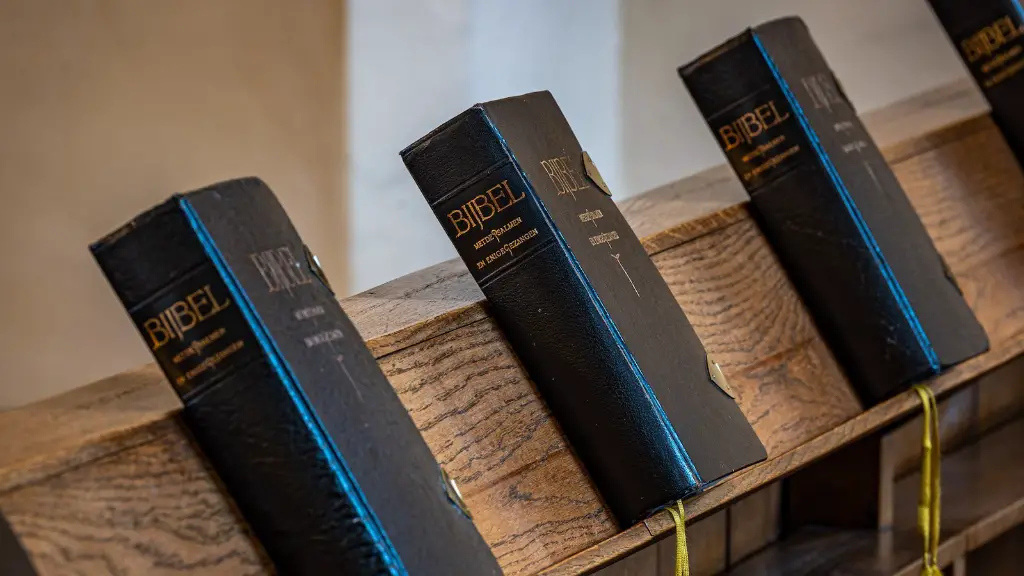Who Got Swallowed by the Whale in the Bible
In the Bible, there is an often-quoted story about someone being swallowed by a whale. But who was swallowed by the whale exactly and what is the significance of this biblical tale? Knowing more about this event and the background behind it can help us understand the greater meaning of its message.
The person who got swallowed by a whale in the Bible is none other than the Prophet Jonah. According to the Book of Jonah in the Old Testament, the Lord commands Jonah to go to Nineveh and proclaim judgment upon the city for their wickedness: “Arise, go to Nineveh, that great city, and cry against it; for their wickedness is come up before me.” (Jonah 1:2 KJV). Jonah, however, does not obey this command and attempts to flee from the LORD instead, by boarding a ship and going in the opposite direction (Jonah 1:3).
In the story, God sends a violent storm upon the ship which forces the sailors to eventually cast Jonah overboard. This is when a large fish (a whale) swallows him. After spending 3 days and 3 nights inside the whale’s belly, Jonah repents and prays to the LORD. This causes the whale to throw him up onto dry land where he is eventually able to fulfill his mission and deliver the Lord’s message to Nineveh.
The episode of the whale swallowing Jonah has a much deeper significance than it may appear at first glance. It can be seen to represent the idea of the Lord’s mercy and a “second chance” for redemption for those who had strayed from their faith. By sending a whale to swallow Jonah and eventually cast him back out, God is giving him an opportunity to repent and change his ways – as long as he is willing to do so.
This is an important lesson for believers and non-believers alike. It is a reminder that no matter what kind of mistakes we make in life, God’s mercy always remains and we have the power to turn our lives around and make right whatever mistakes we have made. The prophet Jonah serves as an example of how even the most dire of circumstances can lead to an opportunity for transformation.
Role of Nature in the Story
The role of nature in this story is also an important element to consider. Throughout history, nature has been seen as a sign of God’s power and as an example of His unwavering mercy. In the Bible, it can be seen as a form of “divine intervention” that enables Jonah to fulfill his mission and spread the Lord’s message. Although the whale played an unwitting part in the ordeal, it can be seen as a metaphor for the power of nature and how it serves as a conduit for God’s will.
The storm that was sent to stop Jonah from fleeing from the Lord’s command is a prime example of this idea. The immense power of the storm—which was so powerful that it caused the ship to be about to be flooded and the sailors to cast Jonah overboard—symbolizes the might of nature and serves as a reminder of God’s divine power and authority. Nature, in this case, is a messenger of God sent to offer Jonah a “second chance” to fulfill his mission and be redeemed.
Conclusion of THe Story
The story of Jonah and the whale is a timeless lesson in the power of mercy and redemption. It teaches us that no matter how dire a situation seems, there is always a chance for transformation and a way back to the right path. This message is particularly relevant today in our ever-changing and often confusing world. It reminds us that although we may make mistakes, God’s mercy and power remain powerful and can enable us to find our way back to righteousness.
Contemporary Relevance
The story of Jonah is still relevant today and can serve as a source of hope for those who may feel lost or overwhelmed by their situation. As with the prophet Jonah, God still offers us a path of redemption that can lead us to a better life, as long as we are willing to accept it. The story can also be seen as a reminder to those in positions of power and authority that they must always remain mindful of God’s grace and mercy and never misuse their power for evil or selfish ends.
In today’s society, the story of Jonah can be seen as a metaphor for the power of faith and forgiveness. No matter how far we stray from the path of righteousness, God is always willing to forgive us and give us a chance to turn our lives around. It is a reminder that mistakes do not have to define us and that we can always strive for a better future by having faith in God’s mercy and the power of redemption.
Interpretations from Other Faiths
The story of Jonah is also found in other major world religions and holds relevance to their teachings as well. In Islamic tradition, the Qur’an contains stories of the Prophet Yunus which bear a strong resemblance to the Biblical tale. For example, Yunus is similarly sent by God on a mission to warn his people of the coming judgment but refuses, and then is swallowed by a fish and eventually released. Similarly, Buddhist and Hindu traditions also contain accounts of someone being swallowed by a giant fish or whale, although their findings do not necessarily relate to Jonah in an explicit way.
In sum, it seems likely that the episode of Jonah and the whale had its root in earlier, folkloric stories and was later incorporated into the Judeo-Christian religion. Nonetheless, it is clear that the message of this story is universal and remains relevant across many faiths and cultures.
Archetypal Significance
The story of Jonah and the whale is seen by many scholars as an archetypal story. This means that it has a deeper, symbolic significance beyond its literal interpretation. Such stories have a repeating theme that can be seen in different cultures and contexts. Jonah’s story can be seen as a symbol of hope, resilience and redemption—of how we can overcome our trials and tribulations in life and find our way back to the path of righteousness.
The story of Jonah is especially relevant today, as we strive to make sense of our ever-changing and often confusing world. It is a reminder that even in our darkest moments, God’s mercy and power still remain and that we always have the power to turn our lives around and be redeemed.
Ritualistic Symbolism
In addition to its symbolic significance, the story of Jonah is also seen to have ritualistic elements. For example, the ship mentioned in the tale is seen as symbolic of the human condition. As human beings, we often attempt to flee from difficult circumstances or unpleasant truths. The storm that arises symbolizes the confrontation of our attempts to do so, forcing us to confront reality and accept the consequences. Similarly, the whale can be seen to represent the idea of renewal and transformation—of our ability to changing our lives and find absolution.
In this way, the story of Jonah and the whale can serve as a reminder of our ability to overcome adversity and find a way back to faith and redemption. It is a powerful symbol of hope and resilience, of how no matter how difficult our situation can be, we can always strive to overcome our trials and be redeemed in God’s eyes.
The Power of Storytelling
Finally, it is important to consider the power of storytelling in relation to the story of Jonah and the whale. Stories are one of the most effective ways of imparting an idea or message to an audience. They have the power to educate and engage their listeners, helping them to understand complex ideas and making them feel invested in the narrative. This is why the story of Jonah is so powerful—it is able to convey a core message in a way that is both accessible and engaging.
Through its story, the Book of Jonah serves as a reminder of the importance of remaining faithful to the Lord and following His commands. It is a message that is still relevant today, as it is a testament to the power of mercy and redemption—of how a wrong can be made right as long as we stay true to our faith. The story is an important lesson, one that we would do well to remember in our ever-changing and increasingly chaotic world.




